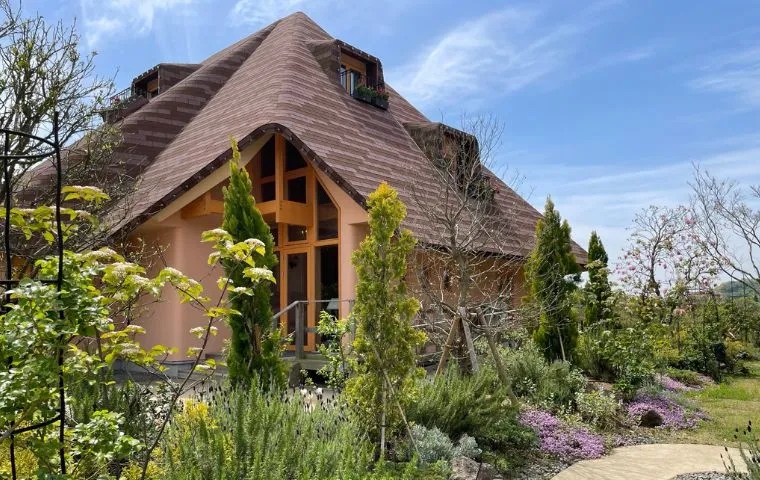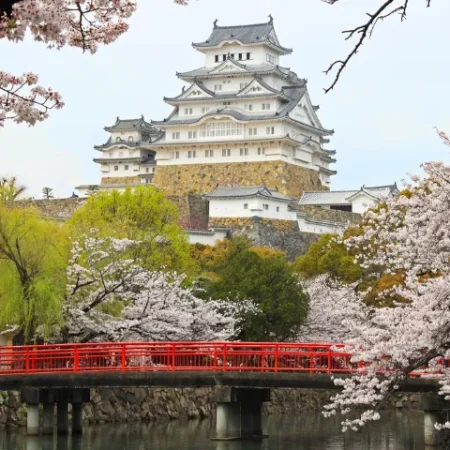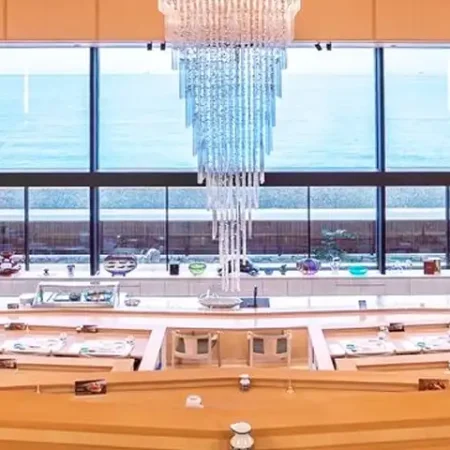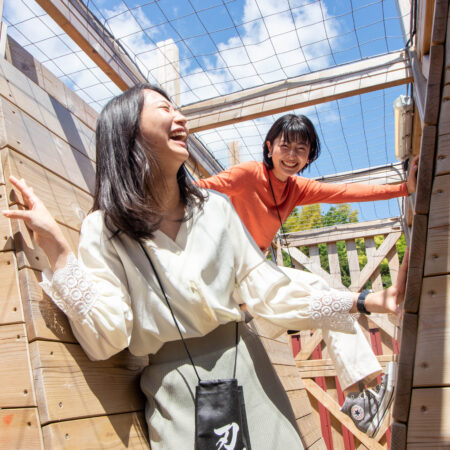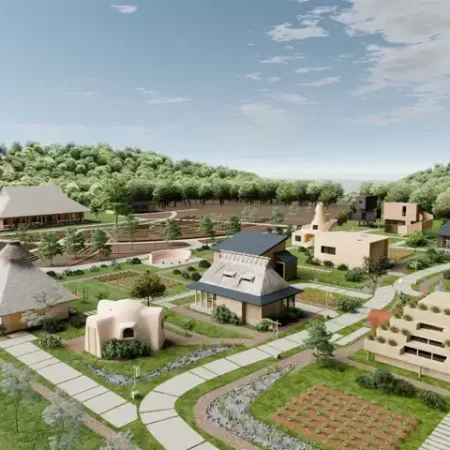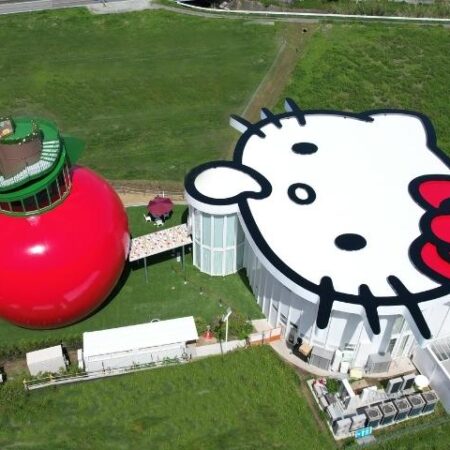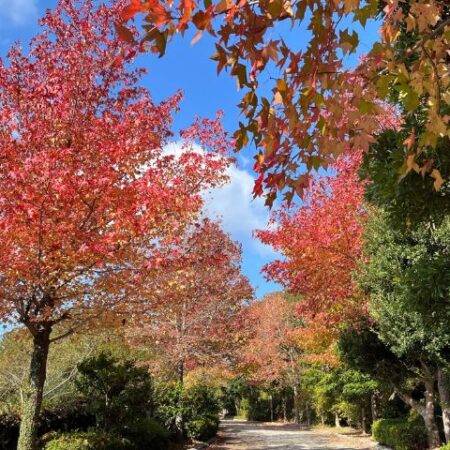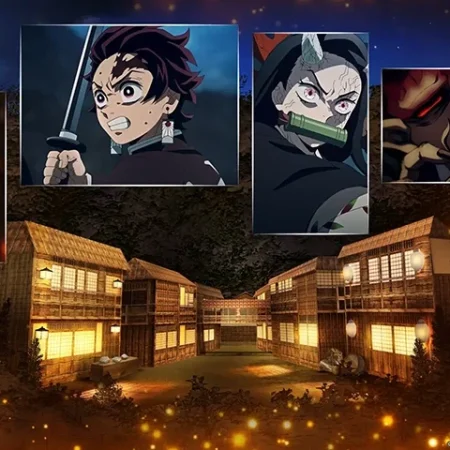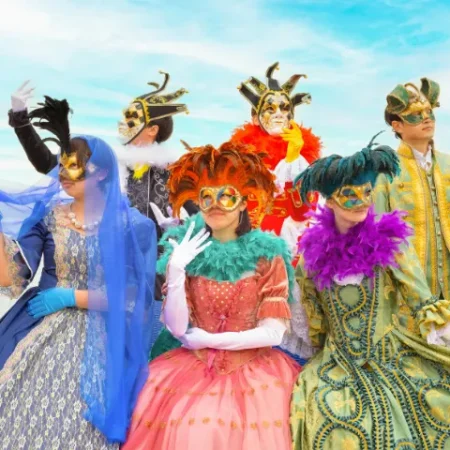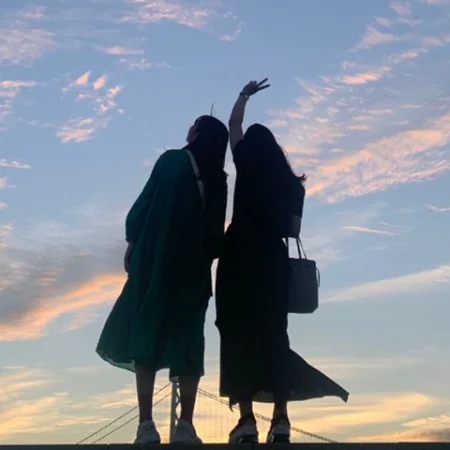“If you want to talk about something new, you have to make up a new kind of language”, wrote Japanese novelist Haruki Murakami. Though he likely meant the written word, food is also a kind of language that speaks to us across borders and time. At the restaurant La Rose, a new language of cuisine is being invented that can only be heard on Awaji island in the heart of Japan. It whispers to our senses about something new: the magic of synergy, when the island’s natural riches merge with the strongest bond in culinary history: Japan and France.
La Rose joins Baobab and Prince Etoile in a trio of French style chalets that form the resort Auberge, Le Foret de la Cuisine Francaise, perched on a mountain ridge on Awaji island. Each cottage offers spacious rooms with a French countryside decor where you can slumber after a luxurious repast. Though dating back to the 11th century French-style inn, the word “auberge” has recently been reborn as part of the growing trend of “destination dining”. Having food as the centerpiece of our trip means feeling the soil, breeze and sunlight that created our meal, what French wine lovers call terroir. Understanding the terroir of what nurtures our body is one way to reconnect with our natural selves.


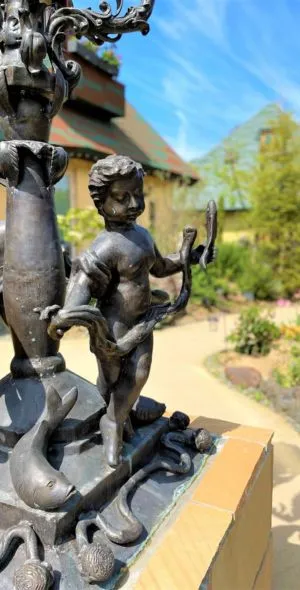
Upon arriving, I entered the wrought iron gate into a curving garden path lined with a wealth of flowers and herbs glowing with vitality. Tall rosemary bushes with clusters of purple blossoms big as bulrushes, vivid splashes of pink and yellow tulips, adorable pansies carpeting the ground. Wending my way through this sculpted meadow, I eventually came upon the idyllic cottage of La Rose. Designed with a rustic charm, it stands in harmony with the surrounding greenery like one more living, breathing being in the garden.
As I climbed the entrance steps, the manager and resident sommelier, Mr. Yusuke Isurugi opened the door to greet me. Over the next while he showed me round the premises and introduced me to my luxurious room. Stepping out onto the veranda, I met a sweeping view of the sun setting beyond the rolling, forested hills of the mountain plateau.
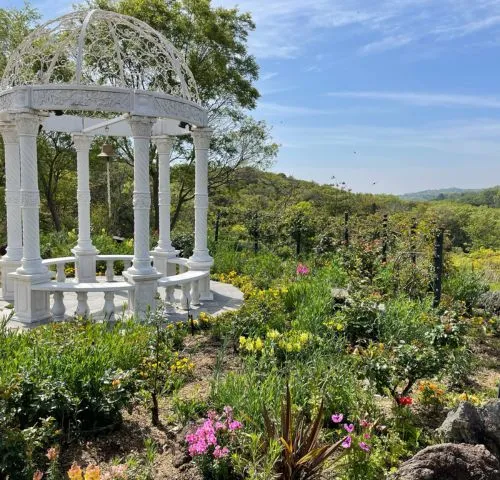
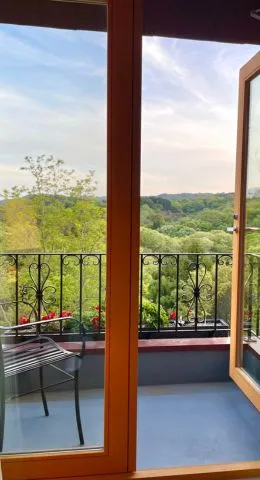
Before dinner I strolled through the grounds, accompanied by the songs of birds, flutter of butterfly wings and, high above, the lazy glide of a hawk. Standing at the mountain’s edge, absorbed in the music of the season, I gazed at the unbroken forested horizon and felt as though I had left the modern world behind, immersed in this timeless realm of pastoral charm.
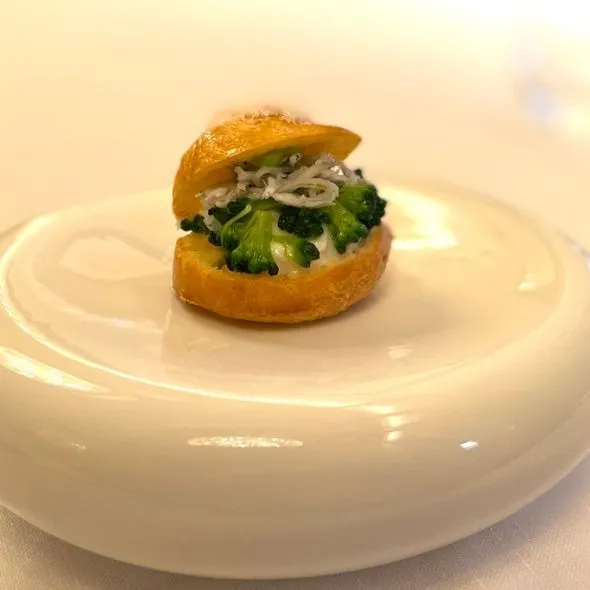
Before I knew it, dinner time had arrived. I went back inside La Rose and was shown to my seat in the well-appointed dining room to enjoy the last rays of sunset. The course began with a tiny amuse bouche, a gougere puff pastry topped with cheese, filled with broccoli grown on Awaji island, and the tiny white fish from the Seto Sea called shirasu. This bite sized savory treat was a fitting “ice breaker” to a conversation that would soon become a love affair. Through the ensuing 9-course dinner, each dish would fuse these three worlds: French tradition, Japanese washoku cuisine, and the nature, both cultivated and wild, of Awaji Island.
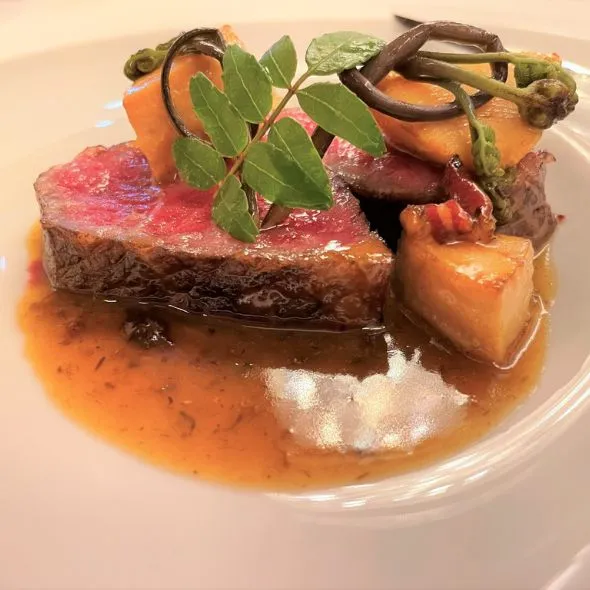
For centuries, this island has literally produced food fit for a king, or in Japan’s case, an emperor. This mythical “first island” of the Japanese archipelago sits in ocean waters divided into bays (Osaka Bay, Wakayama Bay, the Harima Nada Sea) where the waves are tamed into a paradise for marine life while infusing the surrounding soils with rich minerals. Through millennia, a farming and fishing culture evolved to make the most of this natural endowment. Eventually, the island became one of only 3 regions in Japan entrusted to produce ingredients for the Imperial Household, the prestigious designation of “Miketsukuni”, meaning “food country”. The relationship was a 2-way street, as the refined, demanding tastes of aristocrats in the ancient capital guided the efforts of Awaji producers and shaped the evolution of the island’s sumptuous bounty.
Today, for chefs like Mr. Ryotaro Murakami of La Rose, the island is a source of endless inspiration. As he explained to me, his overarching goal is simply to “highlight the beauty of Awaji ingredients,” saying that in his opinion, “simple, natural flavors are best.” This basic philosophy was expressed in every dish, from the French interpretation of a Japanese soup, surinagashi, that blended the sweetness of the island’s famed onions with Hokkaido’s prized Kita Akari potatoes, and the ishidai fish poire simmered with local zucchini, to the climactic charcoal grilled steak of Awaji beef. In each, subtle seasonings allowed the natural ingredients to take center stage.
Through the vocabulary of these dishes, Chef Murakami gives us more than a tour of the island’s flora and fauna. His dishes combine French tradition with Japanese techniques in a meal that is part European banquet, part kaiseki. As often noted, the 1960’s French “discovery” of kaiseki gave birth to France’s nouvelle cuisine. As more French chefs journeyed to Japan in the 19th and 20th centuries, French culinary tradition rapidly transformed, from heavy meat-centered mains flavored with rich sauces, to the kaiseki principles of smaller dishes, artfully plated, where sauces were lighter to celebrate seasonal elements with simplicity.
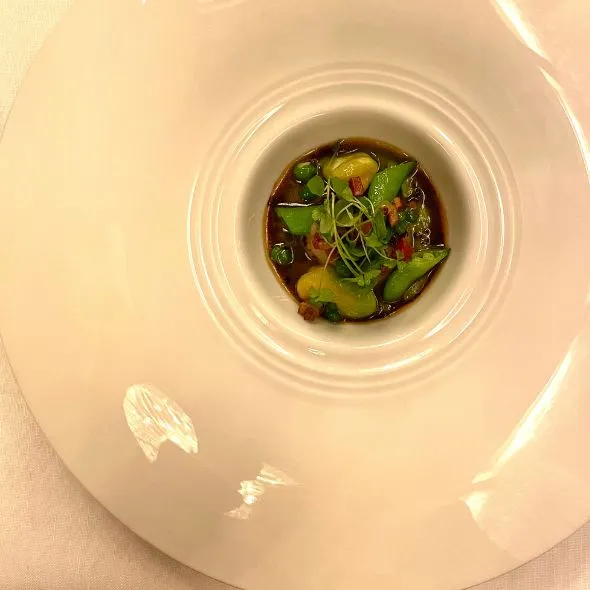
“Tasting menus that you see today around [France], whether it’s 12 courses or 25, are really based on that kaiseki kind of experience,” said Thomas Keller, one of France’s most renowned chefs of haute cuisine.
Chef Murakami, raised near Kyoto and trained on the Mediterranean coasts of La Rochelle and the cobblestone streets of Annecy, is a new generation of Japan-trained French chefs, or France-trained Japanese chefs, each adding their voice to the dialogue between nouvelle cuisine and kaiseki. At La Rose, this language is given the unique accent of Awaji terroir, an element that elevates every bite.
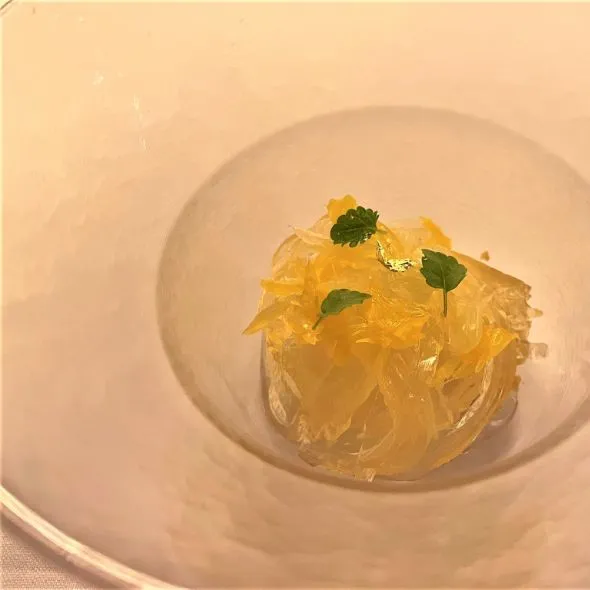
Dessert was a surprising bowl of noodles eaten with chopsticks. Inside the exquisite glass chalice, the Japanese gelatin strings called tokoroten embraced a base of French mousse that married the highly nutritious by-product of sake brewing, sake kasu, with one of Awaji’s early summer citrus fruits, hassaku. The dinner closed as it had opened, with a deeply considered dish encapsulating the history and culture of France and Japan, wrapped in a playful story of the island and the season of the moment. In a few hours, over the course of these innovative delights and with the kind help of my knowledgeable waiter Mr. Yokoi, I was beginning to speak a new language of cuisine.
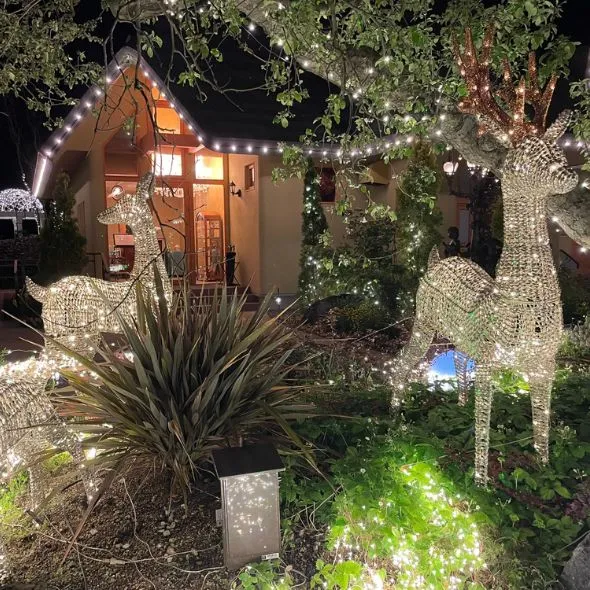
After a digestive stroll through the sparkling, illuminated nighttime garden, I climbed the stairs to sink into the warmth of an aromatic hinoki bath. The next morning, I walked the garden path from La Rose, to the chalet at the far end, Prince Étoile. Here, seated with a view of the sunlit countryside of rolling green hills, the day started healthily with a breakfast featuring the fresh vibrance of Awaji’s fruits and vegetables, balanced with the substance of seasonal quiche, galantine, sausages and French toast.
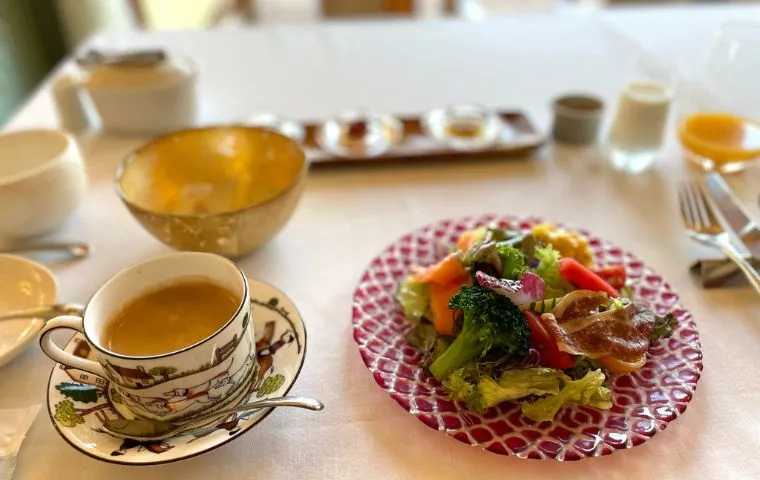
Riding the resort shuttle bus back to the ferry terminal, I really felt as though I had visited a foreign land. Where exactly had I been, though? Was it France or Japan? Yet, with such a tight-knit pair in a truly global world, where exactly does France end, and Japan begin? Auberge is a world unto itself, a garden of diversity where these 2 great culinary traditions are energized by the forces of nature and the fresh flavors of Awaji island, at once a place of rustic simplicity, yet also soaring sophistication. In our time, when the world seems to be growing more divided, places like Auberge that celebrate the earth and create synergy across cultures, yet rise above the trap of stereotypes, may be more precious than any of us appreciate.

Written and photographed by Ren Wong
(Please note that all the information and photos are as of the time of my visit at the end of April.)
| Name | Auberge “French Forest” La Rose |
|---|---|
| Address | 2593-8 Kusumoto Aza Banaka, Awaji City, Hyogo Pref. 656-2301 |
| TEL | 0799-70-9062 |
| Official Web Site | https://frenchnomori.jp/la_rose/ |
| Reservations | https://www.tablecheck.com/en/shops/french-larose/reserve |
| Hotel Reservation | https://www.booking.com/hotel/jp/aubergehurentinosen.ja.html |
| Review | https://www.tripadvisor.com/Hotel_Review-g1022838-d25229759-Reviews-Auberge_French_no_Mori-Awaji_Awaji_shima_Hyogo_Prefecture_Kinki.html |
| Operation Hours | Lunch – 11:30~15:30 (Last Entry: 13:00) Dinner – 17:30~21:30 (Last Entry: 19:00) |
| Closed | Tuesdays |



